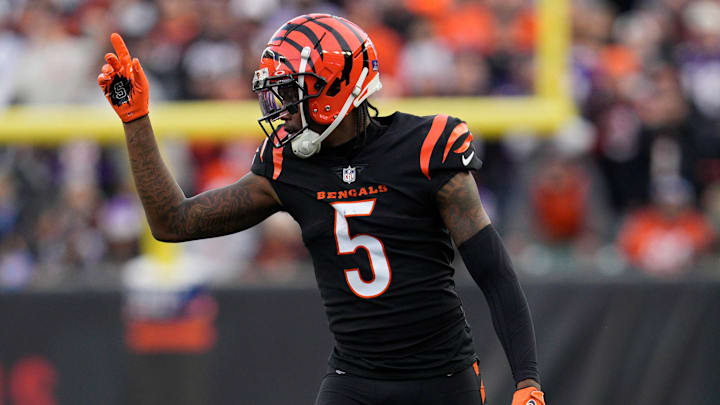A new potential NY Jets wide receiver market has re-entered the conversation, as Cincinnati Bengals star wide receiver Tee Higgins officially requested a trade on Monday morning.
This, of course, doesn't mean that Higgins, who was franchise-tagged this month, will actually be traded. But it does add another possible high-end target to a shrinking wide receiver market.
The Jets are expected to be among the more active teams in said market this offseason, but that doesn't mean they will — or even should — be interested in Higgins at his expected price tag.
Not only would the Jets need to give up significant draft capital to acquire him in a trade — draft capital they don't really have to offer — but it's likely that Higgins will be looking for top-of-the-market money on an extension. The Jets shouldn't bite.
Why a Tee Higgins trade would be detrimental to the NY Jets
Higgins is a good player. The former second-round pick has posted a pair of 1,000-yard campaigns in his career and is generally seen as one of the best WR2s in the NFL. He's a legitimate WR1 on at least a handful of teams.
He is, in fact, a flawed player, however. Higgins ranked 146th out of 153 qualified wide receivers in catch score this past season, per ESPN Analytics. He finished with a troubling 12.5 percent drop rate and hauled in just 34.8 percent of his contested catch opportunities.
This isn't to say that Higgins isn't a very good wide receiver because he is. A hamstring injury cost him five games and limited his production last season. He is, however, a flawed player who will not be worth anywhere near the assets needed to acquire him.
Most contract projections have Higgins making $20 million or more annually in a hypothetical extension. And given the way the market has unfolded, that's probably underselling it.
On top of that, the Bengals would likely be looking for as high as a second-round pick to facilitate a trade. Remember, just because he's requested a trade doesn't mean they have an incentive to make it happen (see: Jonah Williams and Jessie Bates).
It's not about the Jets' desire to "go all-in." If anything, trading for Higgins actively hurts the team's chances of doing just that. It limits the resources they have to address other key positional needs, such as the offensive line.
The Jets should still be aggressive in their pursuit of wide receiver help this offseason, and perhaps other trade candidates like Courtland Sutton or Diontae Johnson — ones that wouldn't require massive extensions — might make sense.
The difference in the assets required to trade for someone like Johnson vs. the assets required to trade for Higgins is not equivalent to the difference in their talent/production level.
Tee Higgins isn't worth the resources the Jets would need to part ways with to land him. Don't be surprised if the Jets feel the same way.
